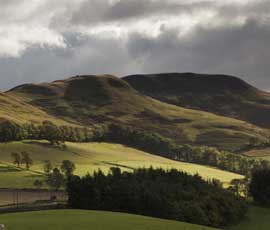RSPB scales up farming ambitions

The RSPB has taken on its own hill farm tenancy to prove that uplands agriculture can make a profit while benefiting the environment.
The conservation charity has taken on the tenancy of Naddle Farm, a 500ha (1250 acre) upland sheep farm above Haweswater in the Lake District.
It will be used as a showcase for “integrating hill farming with habitat restoration to create more space for nature and improve drinking water quality”.
Haweswater is the biggest source of drinking water in north-west England – supplying a quarter of the region’s water to 2m people from Cumbria to Manchester.
The vision for Naddle Farm is to improve biodiversity and water quality, while managing the land as a viable farm enterprise.
RSPB projects
It represents the next stage in the RSPB’s farming ambitions.
The charity already has its own lowland arable farm in Cambridgeshire. The Hope Farm project has been used to showcase farming techniques that boost farmland bird numbers.
As part of the its uplands initiative, the RSPB has entered into a land management partnership with water company United Utilities at its Haweswater estate.
A long-term project will now aim to restore a range of upland habitats including upland heath, broad leaf woodland and blanket bog.
The RSPB claims that restoration work will benefit upland wildlife while reducing the risk of erosion, which makes water more difficult and costly to treat.
The team
RSPB Haweswater development manager Mike Fishpool said: “By restoring upland habitats we aim to create a ‘win win’ situation for both wildlife and water.
“However, the lessons we learn from this project will only be relevant to the wider farming community if we integrate it with a viable farming system.”
Sheep farmer Richard Postlethwaite will manage the agricultural business.
“This project has given me to the chance to fulfil my ambition of becoming a hill farm manager,” said Mr Postlethwaite. “Hill farming is in my blood.
“I was born and bred on a hill farm and I’ve spent my life working on them, including on water catchment land, so I understand the importance of wildlife and water.”
United Utilities said water customers as well as the environment would benefit from the deal.
Catchment manager Paul Phillips said: “Farming this land sustainably helps make sure the water is clearer and cleaner, so it needs less costly chemically-intensive treatment.”
He added: “We’re hoping, with the RSPB, to show how a modern working farm can be sustainable while maintaining upland traditions and making money.
The RSPB will also take a tenancy of Swindale Farm – another United Utilities land holding in the Haweswater catchment – in November.
It will be managed with similar objectives to Naddle Farm. The two farms account for around 30% of the land which drains into the Hawswater reservoir.
